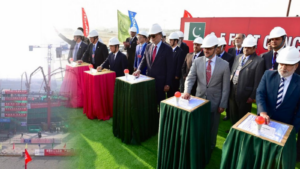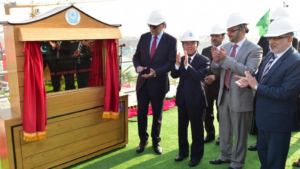<iframe src="https://bwidget.crictimes.org/" style="width:100%;min-height: 250px;" frameborder="0" scrolling="yes"></iframe>
PAEC Commences Building the C-5 Chashma Nuclear Power Plant
An important step in the country’s quest for clean and sustainable energy has been taken with the official start of construction of the Chashma Nuclear Power Plant Unit-5 (C-5) in Mianwali by the Pakistan Atomic Energy Commission (PAEC). This event emphasizes the significance of technological and economic cooperation as well as the long-standing partnership between China and Pakistan in the development of nuclear energy.
Chinese Ambassador Jiang Zaidong and Ahsan Iqbal, Pakistan’s Minister for Planning and Development, were among the notable dignitaries that attended the C-5 project’s groundbreaking event. The strategic significance of this cooperative endeavor, which is expected to support Pakistan’s energy sector and advance the nation’s socioeconomic growth, was highlighted by the attendance of both Chinese and Pakistani leaders.
China-Pakistan Friendship: A Foundation for Progress
Speaking to the crowd as the chief guest, Minister Ahsan Iqbal emphasized the importance of the C-5 project as evidence of Pakistan and China’s long-standing relationship. He highlighted that the C-5 nuclear power station is a prime example of the two countries’ long-standing cooperation, especially in the energy sector.
According to the minister, the building of C-5 will create thousands of work opportunities for Pakistanis and give the local economy a much-needed boost. Additionally, the project will reduce dependency on costly fossil fuels and address the nation’s urgent energy demands by supplying the national grid with affordable and clean electricity.
C-5: A Step Forward for Sustainable Energy
The C-5 Chashma Nuclear Power Plant is expected to grow into the biggest and most sophisticated nuclear power plant in Pakistan. With a 1,200 megawatt (MW) capacity, the project will boost the nation’s nuclear energy production to 4,760 MW, a significant increase. In order to fulfill the expanding energy needs of Pakistan’s industry and people, this growth would be essential.PAEC Commences Building the C-5 Chashma Nuclear Power Plant
Many people agree that nuclear energy is a dependable and sustainable source of electricity. Nuclear power facilities are an important part of international efforts to fight climate change since they release very little greenhouse gas, in contrast to fossil fuel-based power generation. Pakistan will be able to lower its carbon footprint and move toward a greener, more sustainable energy system with the inclusion of C-5 in its energy mix.
Economic Gains and Technological Developments
Modern nuclear technology is incorporated into the C-5 project, guaranteeing high efficiency and safety requirements. This technological development not only demonstrates Pakistan’s dedication to implementing contemporary energy solutions, but it also establishes the nation as a major force in the world energy market.
Making Pakistan a “techno-economy,” where economic growth is driven by technology innovation, is crucial, according to Minister Ahsan Iqbal. By promoting technological know-how, generating employment opportunities, and drawing in international investment, the C-5 initiative supports this goal. Because local industries will be involved in the plant’s development and operation, it also boosts the nation’s industrial basis.
Economic and Social Effects
It is anticipated that the C-5 nuclear power plant’s construction will have significant socioeconomic advantages. Millions of Pakistanis’ quality of life will be improved, and industrial growth will be supported by the project’s provision of dependable and reasonably priced power. Additionally, having access to clean energy will ease the financial strain on businesses and individuals, freeing up funds for other important initiatives.
Additionally, the C-5 project will boost regional economic activity by creating thousands of jobs during its development and operation. Indirect jobs in auxiliary sectors like logistics and transportation are also included, as are chances for engineers, technicians, and skilled workers.
Increasing Energy Security
A key component of national growth is energy security, and the C-5 project is a big step in that direction. Pakistan may lessen its reliance on imported fuels, stabilize energy prices, and protect the economy from changes in the world market by diversifying its energy sources and boosting the proportion of nuclear power.
The long-term energy constraints that have impeded Pakistan’s economic development for years would also be lessened with the addition of 1,200 MW of electricity to the national system. The expansion of agriculture, industrial productivity, and the provision of basic services all depend on a steady supply of electricity, which makes the C-5 project an important investment in the future of the country.
Environmental Factors
Clean and sustainable energy sources are more important than ever as the globe struggles with the repercussions of climate change. The C-5 nuclear power plant provides a low-carbon substitute for conventional power generation techniques, which is consistent with Pakistan’s dedication to environmental sustainability.
Nuclear energy is the perfect way to meet Pakistan’s energy needs because of its low environmental effect and capacity to deliver a steady and uninterrupted power supply. The C-5 project will improve public health outcomes and create a better environment by lowering air pollution and greenhouse gas emissions.
In conclusion
A significant milestone for Pakistan's energy industry has been reached with the start of construction on the C-5 Chashma Nuclear Power Plant. This enormous project symbolizes the common aim of sustainable growth and technological advancement, made possible by the long-standing collaboration between China and Pakistan. The C-5 plant will be essential in tackling Pakistan's energy issues, promoting economic expansion, and improving the standard of living for its people thanks to its ability to produce 1,200 MW of clean and affordable electricity. The C-5 initiative is a ray of optimism and evidence of the strength of global cooperation as the country strives for a more sustainable and prosperous future.






